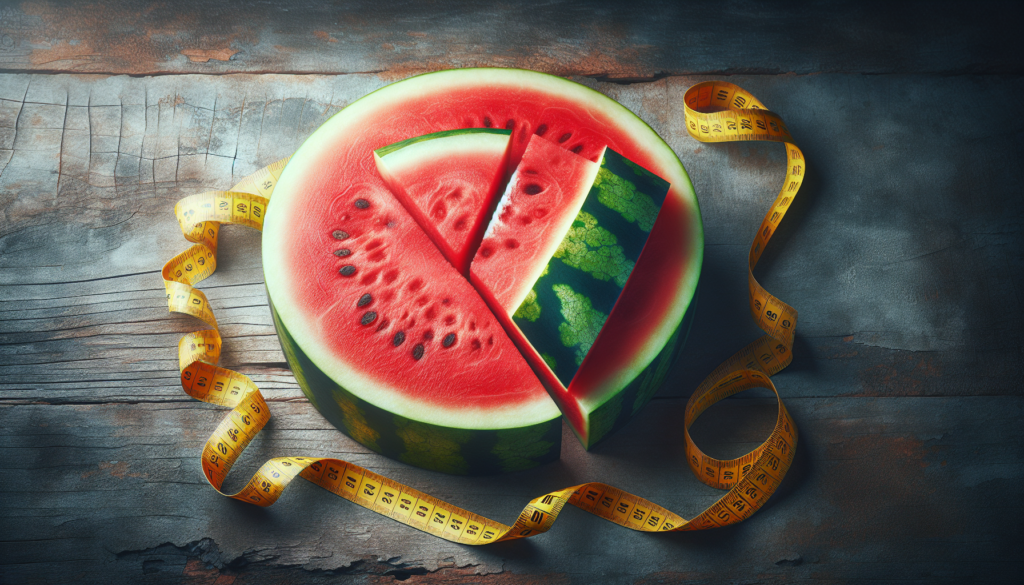
The quest for achieving a healthy weight often leads to exploration of various dietary options, with fruits like watermelon frequently topping the list of “good for you” foods. Watermelon’s refreshing sweetness, high water content, and potential health benefits often lead to the question: Can watermelon help with weight loss? Unearthing a clear answer requires a deeper dive into its nutritional profile, satiety effects, and how it can fit into an overall weight management plan.
Watermelon: A Hydrating Low-Calorie Fruit
Watermelon is a heavyweight in the hydration department, boasting a whopping 90% water content. This not only makes it a refreshing choice but also translates to a low-calorie food; a 100-gram serving packs just around 30 calories. This low-calorie density allows for enjoying a satisfying portion without significantly impacting your calorie intake, which aligns perfectly with the core principle of weight loss – burning more calories than you consume.
Weight Management Benefits Beyond Calories
The treasure trove of nutrients within watermelon plays a crucial role in weight management. It’s a good source of essential vitamins like vitamin A and vitamin C, potassium, and antioxidants, particularly lycopene (the pigment responsible for its vibrant red color). While these nutrients don’t directly translate to weight loss, they support overall health and well-being, which is crucial for maintaining an active lifestyle that aids in weight control.
Watermelon for Feeling Fuller, Longer
Beyond its basic nutrient profile, watermelon has been shown to promote satiety, the feeling of fullness that helps curb cravings and reduces the likelihood of overeating. The fruit’s high water and fiber content are key players in this benefit. A study published in the journal Nutrients even revealed that daily consumption of watermelon could contribute to a reduction in body weight and body mass index (BMI), suggesting that regular inclusion in a diet may support weight management goals.
Watermelon and Exercise Performance
Watermelon also contains amino acids such as arginine and citrulline. Early research suggests these compounds may improve blood flow and enhance athletic performance. An increase in exercise capacity can lead to more effective workouts, potentially burning more calories and contributing to weight loss over time.
The Importance of Moderation
However, the key to unlocking watermelon’s potential for weight loss lies in how you consume it. Integrating watermelon into a balanced diet as a refreshing snack or healthy dessert is a sound strategy. However, extreme approaches like the watermelon cleanse may promote rapid but unsustainable weight loss. Any diet advocating for exclusive or predominant consumption of a single food group typically lacks the nutritional balance required for a healthy lifestyle and may pose risks due to nutrient deficiencies and rapid weight fluctuations.
Sugar Content and Glycemic Index
It’s also important to acknowledge the natural sugar content in watermelon. While not processed sugar, watermelon does rank higher on the glycemic index, meaning it may cause a temporary rise in blood sugar levels. However, its glycemic load – which considers the actual amount of carbohydrate it contains in a typical serving – is relatively low, making it less concerning for weight management if consumed in moderation.
Watermelon and Water Intoxication: A Rare Concern
The discussion about watermelon and weight loss does involve considering potential risks like water intoxication if consumed in excessive amounts. However, this is an uncommon scenario that doesn’t outweigh the fruit’s potential benefits.
Watermelon: A Supportive Tool, Not a Magic Bullet
In conclusion, labeling watermelon as a magical weight loss fruit might be an overstatement. However, considering its properties and potential benefits, watermelon can be a valuable component of a healthy weight management plan. It delivers essential hydration, vitamins, and minerals, and promotes feelings of fullness – all while remaining a low-calorie treat. Moderation, as with any other food, is key. Watermelon can support weight loss efforts when it complements a well-rounded diet and regular physical activity. By embracing this sweet, hydrating fruit within the context of a balanced and diverse diet, you could very well contribute to a healthier weight and lifestyle.